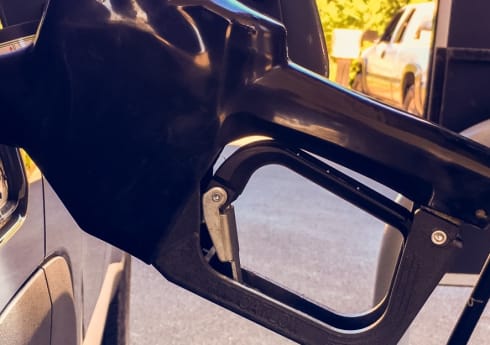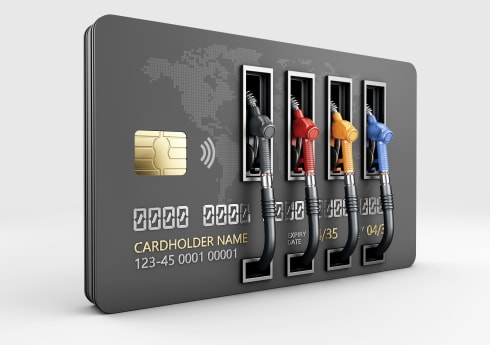Fuel Card Tax Explained
- How can fuel cards make doing your taxes easier?
- What records do you need to keep in case HMRC wants to check your travel expenses are in order?
- How does a fuel card work with tax? and more
(Updated Tue, 5 March 2024)
Disclaimer: This article is intended as general guidance for small businesses and sole traders, but it is not financial or taxation advice specific to your situation. You should always consult your company accountant if you have any questions about how taxation rules apply to you or your business.

How does a fuel card work with tax?
Let’s begin by getting straight to the nitty gritty of the fuel card tax question.
The tax you must pay on fuel will be the same regardless of whether you buy it using a fuel card, cash or any other method.
What you need to keep in mind is you must save all your fuel receipts for three years after the end of the tax year they date from. This is not just advice, it’s the law! HMRC can come after you for four years’ worth of receipts, to prove you can support your VAT reclaims. It may seem like a hassle, but the good news is you can still claim back VAT on the fuel you have used for business trips over the last three years.
Where fuel cards make a difference is in simplifying the practicalities of calculating and paying tax.
So, how can fuel cards make doing your taxes easier? Well, when your employees use fuel cards, everything they buy is listed in the card provider’s client portal. This means you don’t have to log your employees’ fuel receipts manually, you just have to store them in an organised way.
Count the number of receipts each driver gives you and the number of transactions in your fuel card customer portal, to make sure they tally. When it comes to claiming back VAT in April, you can download a consolidated invoice with everything HMRC needs to know.
Fuel card tax: Do you get taxed on a company fuel card?
No, there’s no fuel card tax you have to pay if you use the fuel card for business trips only. Using a fuel card solely for business purposes is not classed as a taxable benefit.
But if the fuel card is also used to cover the cost of fuel for personal travel, fuel card tax does come into play. The company is liable to pay users’ National Insurance contributions on the value of the fuel being used for personal use.
Is there VAT on fuel?
Yes, there is VAT on fuel and it’s applied after fuel duty. While the fuel duty is included in the fuel price, VAT is calculated at a standard rate of 20%.
The fuel duty rate depends on the type of fuel.
That means you pay different rates on different types of fuel. For example, you pay a rate of 52.95 pence per litre for petrol, diesel, biodiesel and bioethanol, and a rate of 28.88 pence per kg for LPG.
Fortunately, you can reclaim VAT on fuel when it comes to fuel used for business miles or on a company car. And with the HMRC’s fuel card tax calculator, it should be easy to figure it out.
If you use company cars, you should also read about advisory fuel rates for company cars.
How much does a fuel card cost in tax?

Another common question about fuel card tax.
If used to cover the cost of fuel for business trips only, nothing. But if your employees use the fuel card to pay for fuel on their personal travels as well, that’s when the fuel card becomes a taxable benefit. You can read about how fuel cards work for employees for more info.
Your employees should keep records of their mileage for personal use and then pay your company back for this fuel. Your company will need to store these mileage logs for four years, to show HMRC that you maintain records and that your VAT reclaims are justified.
iCompario tip:
Vehicle tracking apps or websites, also known as telematics, will create a trip log like this for you automatically. You can download the data as a CSV file. All your employees will have to do is add in the reason for the journey. This saves your employees time. It also makes mistakes and dishonesty impossible. Look at our section on vehicle trackers if you want to know more. Several of the entry-level systems have an all-in cost of less than a pound a day.
How do you define work mileage and non-work mileage for fuel card tax purposes?
Sometimes the difference between a work journey and a non-work journey isn’t as clear as you might think.
Here’s an example. Let’s look at an imaginary company called Everything Ltd.
Sally works for Everything Ltd. as a sales rep, and she buys petrol with a company fuel card. She has to log her exact mileage for every journey on a spreadsheet.

Sally records her commute to and from the office, which is her regular place of work. This isn’t considered business use. Normal commuting counts as personal travel. For these journeys, Sally checks YES in the mileage to pay back column.
Sally makes journeys to and from client sites, and these are considered ‘temporary workplaces’. She includes journeys to and from her hotel, while she’s staying in London. For these journeys, Sally checks YES in the column mileage Everything Ltd. pays for.
Jack works for Everything Ltd. as a plumber.

He drives to each client site in a van which belongs to Everything Ltd. He doesn’t keep a log of his mileage, because he leaves the van in the depot at the end of his shift and goes home in his own car. This means all the fuel he puts into the van is for work use only.
iCompario tip:
As a fuel card user, you will not need to rely on these as your card provider’s software will give you the details. Many fuel cards provide a fixed diesel, petrol, unleaded or other fuel price for a week. This makes it easy for you to work out the price for all mon-work mileage done that week, driver by driver.
Can I pay for my employees’ non-work fuel?
Yes, you can. If your employees use fuel cards to fill up cars that are for mixed use, you can let them keep the fuel as a perk. But remember this is a taxable employee benefit.
The tax charged on fuel when it’s given as an employee benefit is called the Fuel Benefit Charge.
At the end of the tax year, you’ll need to do two things:
- Report what you pay on form P11D, your end-of-year expenses and benefits report for employees and directors. You must report to HMRC the full extent of personal use across all your vehicles and employees. This includes any fuel for personal use, and any company vehicles also used for private journeys.
- Pay Class 1A National Insurance contributions on the value of the fuel.
You can find out more by reading HMRC’s guidance on car and car fuel benefit for full details of the rules and when they apply.
To get the best fuel prices, make sure you check out the biggest and best fuel discount cards in the UK.
How much VAT on fuel can I reclaim?

You have two choices to claim VAT on fuel used for work trips.
1. Actual VAT
Use the actual amount of VAT that was charged on all the non-work fuel your employee bought with their company fuel card. In dealing with HMRC, fuel cards can really be of great help.
You’ll find this VAT data in your fuel card account management portal, no matter which card provider you use. Few card providers have full data going back four years. The legal responsibility to save this data is yours, not theirs. Print out the data at the end of the tax year, or store it electronically, and save it with your tax return so you have no difficulty accessing the complete data even after four years. If you throw the records away and then get inspected by HMRC, you could find yourself in a pretty unpleasant position.
2. VAT fuel scale charge
Alternatively, you can use the VAT fuel scale charge that HMRC provides. This is your only option if you don’t keep a detailed log or don’t have fuel cards.
You can reclaim 100% of the VAT from business fuel if you also pay a VAT fuel scale charge. It’s a simplified way of taxing private use fuel.
You find out how much to pay by using the HMRC VAT fuel scale charge online calculator. To use this, you need to enter the relevant car or van’s CO2 emissions, which you will usually find in the vehicle’s log book.
If you run a vintage car chauffeur service, or for some other reason have business vehicles made earlier than 1997, you will enter a figure based on the engine size instead of the CO2 emissions.

Please note that this scale changes four times a year. The change dates are the first of March, June, September and December.
This VAT reclaim method is one of the easiest for HMRC to check, and catch companies on. You may be shocked how many companies forget to pay the fuel scale charge. Even when they do, they often don’t update the amounts when the fuel scale charge changes.
iCompario tip:
You can reclaim VAT paid on other things you’ve bought for your company vans or cars, such as AdBlue and oil, running and maintenance costs or off-street parking.
If your drivers pay for AdBlue, oil, road tolls and bridge tolls with the company fuel card, the dates and amounts will be logged in your fuel card provider’s management software.
You do have to pay employers’ National Insurance (which is class 1A) on some motoring costs if they’re considered employee benefits.
This includes parking permits, and also tolls and congestion charges which were paid during non-work journeys.
You don’t pay any national insurance on servicing and insurance costs.
Find the best fuel cards in the UK.
Can I just not bother reclaiming VAT on fuel at all?
Yes, this is an option.
But the only reason we can think of why a company would choose this is if they just find it all too confusing and don’t know how to reclaim VAT on fuel. There’s no actual benefit.
If this is what you’ve been doing, we think it’s seriously time to get a fuel card!
Any business and sole trader can find a suitable fuel card. There are fuel cards for small businesses as there are fuel cards for construction companies. And if your company uses electric vehicles, you should check out the range of electric fuel cards.
Don’t suffer alone – HMRC offers help with fuel card tax
The process of reclaiming VAT seems complicated at first, but most companies find it’s actually easier than they feared after bracing themselves to so it first time.
“I was woken up by a phone call telling me I’ve committed tax fraud. They must have had the wrong number, cause I don’t pay taxes.”
If you can afford a company bookkeeper to take care of this along with everything else, they are worth the money.
If not, remember HMRC is keen for you to get it right. If you ask them for advice or help, they’re usually very willing to guide you through how the rules apply to you. They’re also providing useful tools like the company fuel card tax calculator. Just make sure you’ve read the rules online so you’re not asking them questions about something you could have looked up for yourself.
Having fuel cards can save your business money, do your driver fuel expenses claims automatically and make it a 30-second job to reclaim your fuel VAT. As a free comparison site, iCompario can find you offers on cards from all the big oil companies or multi-brand cards and deals with no minimum purchase or tie-in contracts.


